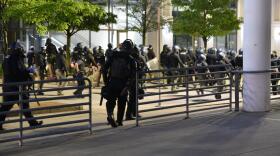Southeast Michigan – specifically cities like Hamtramck and Dearborn – is known as a hub of Arab American culture. But that group is not a monolith. Individual ethnic groups have their own cultures, cuisines, and stories about how they settled down in Michigan. That includes the more than 30,000 Yemeni Americans living in the region.
The origin story of how the Yemeni community in Michigan is an interesting one. Way back in the early 1900s, Henry Ford started recruiting Yemeni workers to work at Ford's factories. After a few years, Ford sent for more workers and the Yemeni American community began to grow. People who gained citizenship during their time working for Ford brought family over and started lives in Michigan while remaining close to their family back in Yemen.
Now more than 30,000 Yemeni Americans live in Michigan. In recent years, the civil war in Yemen, and subsequent humanitarian crisis, has driven a new wave of immigration. The Yemeni community lives largely in Hamtramck and Dearborn, but it differs in several ways from other Arab American communities in the area.
“The Yemeni community is a distinct community that really deserves to be looked at in its own right” says Brian Stone. “Often umbrella terms like Middle Eastern or Arab Americans are used, and it really papers over the things that are specific and unique, special about the Yemeni community."
Stone is the the English language editor for the Yemeni American News. He says Yemeni have a unique culture and cuisine, and they speak a distinct dialect of Arabic. In addition, Yemen sits at the crossroads between the Middle East and Africa, and many Yemeni people have darker skin than other Arab Americans.
The Yemeni community in Southeast Michigan has been active during recent Black Lives Matter protests with the group Detroit Will Breathe. Stone notes that the racial justice movement across the country to demilitarize police coincides with Yemeni Americans’ desire to see a demilitarized United States.

“There is a real feeling within the Yemeni community that the United States could do more to create peace in the civil war situation,” Stone said. “Why spend money on bombs blowing up villages in Yemen which could be spent building up villages here in the United States? And so these two groups really got together and found an affinity over this issue, and that’s what the protests in Hamtramck were really about. It was about standing up for racial justice while standing up for justice for Yemenis here and abroad.”
The Yemeni American News serves as a paper of record for Hamtramck. The decline of local news has pushed the paper into focusing on wider issues in Hamtramck beyond just Yemeni centered events.
Like every community in Michigan, the COVID-19 pandemic has put a strain on Yemeni Americans here. They tend to have large families and be active in their communities. Weddings and family gatherings that usually take place over the summer have been canceled. For Muslim Yemenis, mosques have closed down as well. However, Stone says, the protests demonstrate that the pandemic hasn’t dulled the community’s resolve.
Support for arts and culture coverage comes in part from the Michigan Council for Arts and Cultural Affairs.
This article was written by Stateside production assistant Olive Scott.






